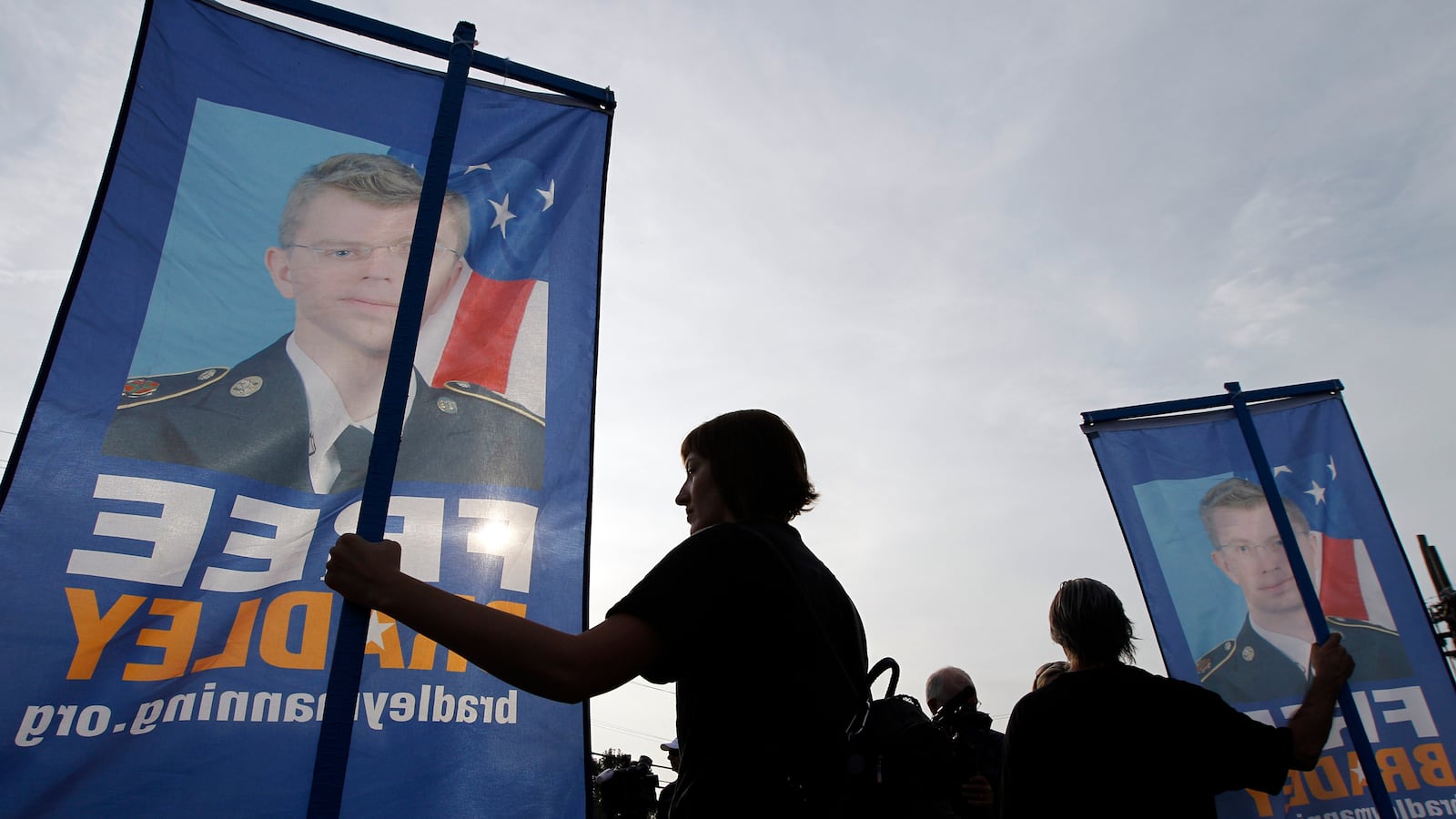Bradley Manning is not Edward Snowden and he is most definitely not a hero. Let’s get that straight, for starters.

Manning is not a whistleblower motivated by either ideology or principle. Nor, despite the claims of some, is he a poster child for transgender rights being persecuted for his gender or sexual orientation. Analyses that have focused on Manning's personal conflicts over his sexuality and the limitations it placed on his ability to serve miss the point as much as those that have declared him a free-speech martyr. He did not deliberately and methodically set out to expose a discrete government program that he had come to believe was unconstitutional. He was not sentenced for his gender preferences or how he chose to dress. He was a troubled kid looking to make a mark who simply spilled every secret he knew, the equivalent of screaming as loud as he could in the hope that all that noise would bring some attention.
After he leaked the documents, Manning did not flee to Hong Kong or Russia. He failed to plan that far into the future and so he will not avoid the worst consequences of his actions. Perhaps he was too unsophisticated to predict them. Perhaps he got in over his head.
The real question is: how did Manning wind up with access to classified documents and national-security secrets? The answer is, he did not get there alone.
Over the past decade the Defense Department made a series of conscious decisions to lower the bar for entry into the military and to accept candidates whom it had once deemed unfit for duty. In order to sustain wars on multiple fronts, fought without a draft, the standards for enlistment and service overseas dropped conspicuously, and in some cases, as with Manning, even those who could not meet the new, lowered standards were waved through.
With no great expansion in the size of the military to accompany these fights, we have plugged the holes with civilian contractors, like Snowden, and with obviously unfit soldiers, like Bradley Manning. We have imprisoned lower-enlisted men and women for their very real crimes, while allowing our presidential, congressional, and military leadership to act with relative impunity. Now we reap the rewards.
What Kind of Soldier Was Bradley Manning?
When I was in the army, soldiers used to talk about, “dirtbags,” “shitbirds,” and “shammers.” We applied these cruel labels to the kids who, for whatever reason, just couldn’t hack it. Some of the “shitbirds” had legitimate personality disorders, and others seemed damaged in different ways—they were just off—too idiosyncratic for soldiering, or maybe too sensitive. The “dirtbags” lied to you when they didn’t have to. You couldn’t trust them not to go into your wall locker and steal your stuff. They were the borderline or actual criminals. Then, finally, there were the “shammers,” the troops who actively tried to get out of duty by citing injuries or hardships, real or imagined.
All of these people had their reasons for enlisting in the first place. They sought money, an escape, an adventure, a way to serve their country, or a way to prove something to someone by joining the army and going to war. For whatever reason they had enlisted, once they got to basic training, they stuck out miserably. To say they were bullied would be accurate but would miss something about the character of the army, an institution in which tough-guy power relations are the norm—even tacitly encouraged—and do not form a remarkable exception.
By some accounts, the trouble started early for Pfc. Manning. One of his fellow basic trainees described him this way: “He wasn’t a soldier—there wasn’t anything about him that was a soldier. He has this idea that he was going in and that he was going to be pushing papers and he was gonna be some super- smart computer guy and that he was gonna be important, that he was gonna matter to someone and he was gonna matter to something. And he got there and realized that he didn’t matter and that none of that was going to happen.”
The soldier who made this statement met Manning in a discharge unit at Fort Leonard Wood, Mo., where they both awaited an exit from the army. For unclear reasons, Manning’s drill sergeants had deemed him unfit for duty. Under the authority of his unit commander, they had removed him from his regular training platoon. Manning waited in the discharge unit for a resolution to his case. Meanwhile, rumors circulated that he was gay. The soldier who knew him back then had this to say about it:
“The kid was barely 5 feet—he was a runt. And by military standards and compared with everyone who was around there—he was a runt. By military standards, “he’s a runt so pick on him,” or “he’s crazy—pick on him”, or “he’s a faggot—pick on him.” The guy took it from every side. He couldn’t please anyone. And he tried. He really did. You know what little interaction I had with him personally—it was like he was seeking approval. And he was really good with me but … there were three guys cornering him up front and calling him a Chapter 15—calling him a faggot.”
Manning, not even in the real Army yet, was already being told that he’d never belong, that he was disqualified from being a soldier not only because of his difficulty meeting training requirements but also because of his demeanor or sexual preference. But Manning’s sexuality was clearly not his only obstacle to fitting in. Countless gay soldiers have served with distinction.
Waiting in the discharge unit, Manning’s fate was changed again when a second commander at Fort Leonard Wood overturned the earlier decision to remove him from the Army. Instead, he was allowed to continue with his training. The rest is history. Manning could have had a very bad few weeks, ending with an administrative separation and no permanent black mark on his record. Instead, he will likely end his military career in the United States Disciplinary Barracks.
It’s not Edward Snowden that Manning reminds me of, but Pfc. Lyndie England, the woman convicted for her role in abusing prisoners at Abu Ghraib. Both are essentially pathetic figures, misled and used by other, more powerful men. In Manning’s case, it was Julian Assange. For Lynndie England, it was Charles Graner, the older soldier who appeared with her in many of the now-infamous photos.
Graner argued at his court martial that the repugnant pictures documented legitimate uses of force that had been okayed by higher authorities. And in a way, he was right. Memos signed by the Vice President and the Secretary of Defense authorized stress positions, nudity, hoods, dogs, and other forms of humiliation shown in the photos. What Graner added were the brutal flourishes on a theme created by Cheney and Rumsfeld.
Unlike Lynndie England, there is no torture memo that Bradley Manning can point to and use as his defense. He cannot claim that he was simply following orders. He can, however, claim that other people should have known—that they did know he did not belong in the Army. That he certainly should not have been entrusted with access to hundreds of thousands of sensitive documents.
Those drill sergeants at Fort Leonard Wood knew. Manning’s supervisor, to whom he sent a photo of himself dressed in drag, must have known. Not that Manning was queer—duh—but that he was reckless and inappropriate. Even Manning’s only friend in the discharge unit believed “the runt” was not cut out to be a soldier. Yet, in spite of it all, Manning was deployed to Iraq.
That is why, like Lynndie England, Bradley Manning is symptomatic of a larger problem. The issue is supply and demand. The military needed warm bodies to keep the wars going, especially when Manning went through basic training in 2007 during the height of the surge in Iraq. A year later, USA Today reported that more than 43,000 U.S. troops who had been listed as medically unfit for combat—according to the Pentagon’s own records—had nevertheless been deployed to Iraq and Afghanistan.
In some quarters Manning is being treated like a martyr. He might be one, but not a martyr to truth and justice. He has instead laid himself on the altar of the vast security state. It collects a growing quantity of intelligence, much of which goes forgotten and unattended. It then proliferates this material—whose misuse can ruin or end lives—among poorly vetted employees. In the story of Bradley Manning, we see the confluence of two troubling, growing trends: the meeting of the over-classified and the unqualified.






